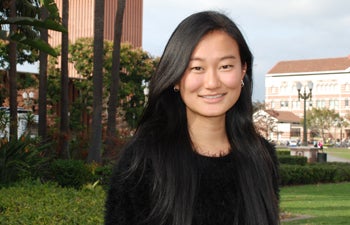Improving the Human Experience
Moeka Komachi has been interested in the way the mind works since her high school days in Hong Kong. As a teenager, she began her inquiry when she selected psychology as her concentration for an International Baccalaureate program.
From teaching techniques for students with learning disabilities to learning how an organization can improve employee productivity, psychology is applicable to anything in life, said Komachi, an international student in the Master of Science in Applied Psychology program at USC Dornsife.
“As long as there are people involved, psychology is relevant in any context or culture,” she said.
Recently, Komachi was honored for her psychology research. As an undergraduate studying psychology at the University of Hong Kong, she participated in an internship at a special needs school where she helped 4 to 6-year-old children who were diagnosed with dyslexia and attention deficit hyperactivity disorder (ADHD) to learn English.
Typically, students learning English in Hong Kong must memorize words and phrases — a challenging undertaking for people with dyslexia, who can have difficulty reading, writing, spelling or speaking.
“I was frustrated with the way the children would come in hating learning a language because of the way it was taught,” Komachi said. “That was the inspiration for writing my paper.”

Moeka Komachi studies consumer and organizational psychology in the Master of Science in Applied Psychology program at USC Dornsife. Photo by Michelle Boston.
Komachi and her colleagues used a combination of learning techniques — visual, auditory and kinesthetic — to help students overcome the challenges of dyslexia.
For instance, to help the children distinguish between the letters b and p, students would hold tissue paper in front of their mouths as they pronounced the sound each letter makes. They would observe whether or not the paper moved. For the aspirated p, the tissue would flutter; for b, it would not.
“It was a move away from pen and paper learning where we could demonstrate phonetic differences,” Komachi said.
In November 2013, her research was named Highly Commended in Social Innovation by the Undergraduate Awards, an international academics awards program recognizing exceptional undergraduate coursework.
The honor earned her an invitation to the 2013 Undergraduate Global Summit in November in Dublin, Ireland. There, she joined students from around the world to present her research and participate in academic discussions. At the conference, Komachi was presented with her award by the Lord Mayor of Dublin Councillor Oisín Quinn. She also had the opportunity to hear from eminent speakers including Mae Jemison, a physicist and retired NASA astronaut, and visit Google’s Dublin headquarters.
Komachi mingled with students in the fine arts, literature, math science and engineering. “Coming from a background in psychology it was enlightening to hear about research in so many different disciplines,” she said.
Encouraged by the recognition, she said she learned that “if you’re confident in what you do and believe in your work, it’s worth sharing.”
At USC Dornsife, Komachi is continuing research into ways that psychology can be used to improve the human experience. Currently, she is focusing on consumer psychology and organizational psychology — the study of the workplace with the intention of improving the performance and well-being of employees and organizations.
Her final research project will investigate the effects that temperature can have on employees. Studies suggest that the climate can affect interpersonal relationships as well as cognitive functions such as memory.
“In psychology,” she noted, “you can explore how seemingly trivial factors can make a big difference.”